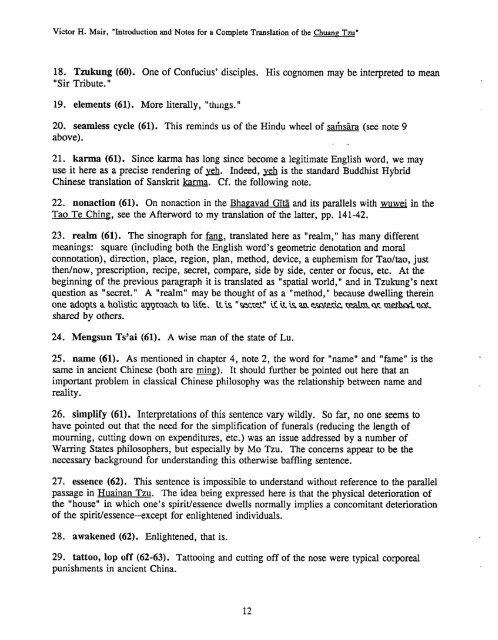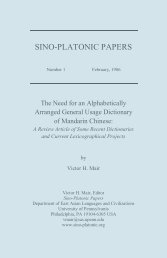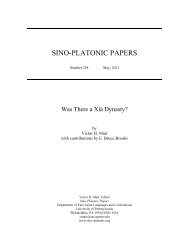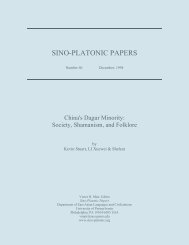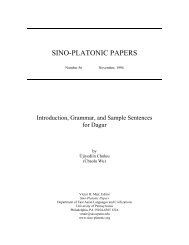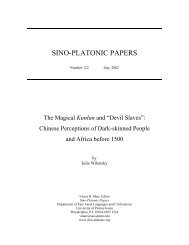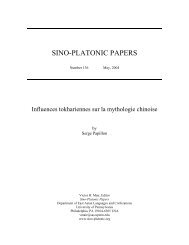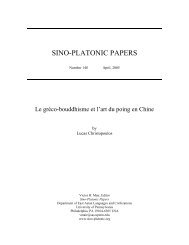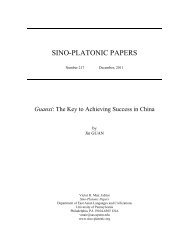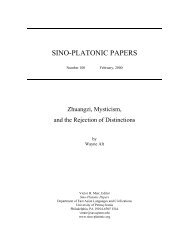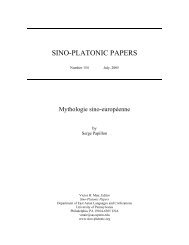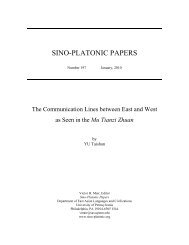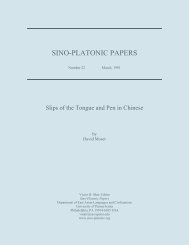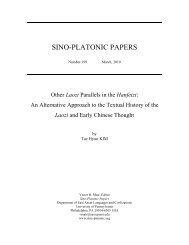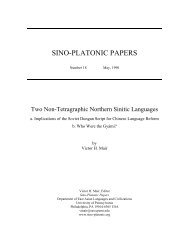Introduction and Notes for a Complete Translation of the Chuang Tzu
Introduction and Notes for a Complete Translation of the Chuang Tzu
Introduction and Notes for a Complete Translation of the Chuang Tzu
You also want an ePaper? Increase the reach of your titles
YUMPU automatically turns print PDFs into web optimized ePapers that Google loves.
Victor H. Mair, "<strong>Introduction</strong> <strong>and</strong> <strong>Notes</strong> <strong>for</strong> a <strong>Complete</strong> <strong>Translation</strong> <strong>of</strong> <strong>the</strong> Chuane <strong>Tzu</strong>"<br />
18. <strong>Tzu</strong>kung (60). One <strong>of</strong> Confucius' disciples. His cognomen may be interpreted to mean<br />
"Sir Tribute. "<br />
19. elements (61). More literally, " thngs. "<br />
20. seamless cycle (61). This reminds us <strong>of</strong> <strong>the</strong> Hindu wheel <strong>of</strong> sahsiira (see note 9<br />
above). - ...<br />
21. karma (61). Since karma has long since become a legitimate English word, we may<br />
use it here as a precise rendering <strong>of</strong> a. Indeed, ~h is <strong>the</strong> st<strong>and</strong>ard Buddhist Hybrid<br />
Chinese translation <strong>of</strong> Sanskrit karma. Cf. <strong>the</strong> following note.<br />
22. nonaction (61). On nonaction in <strong>the</strong> Bhaeavad Git2 <strong>and</strong> its parallels with wuwei in <strong>the</strong><br />
Tao Te Ching, see <strong>the</strong> Afterword to my translation <strong>of</strong> <strong>the</strong> latter, pp. 14 1-42.<br />
23. realm (61). The sinograph <strong>for</strong> fang, translated here as "realm," has many different<br />
meanings: square (including both <strong>the</strong> English word's geometric denotation <strong>and</strong> moral<br />
connotation), direction, place, region, plan, method, device, a euphemism <strong>for</strong> Tao/tao, just<br />
<strong>the</strong>nhow, prescription, recipe, secret, compare, side by side, center or focus, etc. At <strong>the</strong><br />
beginning <strong>of</strong> <strong>the</strong> previous paragraph it is translated as "spatial world, " <strong>and</strong> in <strong>Tzu</strong>kung's next<br />
question as "secret. " A "realm" may be thought <strong>of</strong> as a "method, " because dwelling <strong>the</strong>rein<br />
one adopts a holistic appraack ta life. Zt is " secret" if it is a es~ktis. tealm ar n&saL cat<br />
shared by o<strong>the</strong>rs .<br />
24. Mengsun Ts'ai (61). A wise man <strong>of</strong> <strong>the</strong> state <strong>of</strong> Lu.<br />
25. name (61). As mentioned in chapter 4, note 2, <strong>the</strong> word <strong>for</strong> "name" <strong>and</strong> "fame" is <strong>the</strong><br />
same in ancient Chinese (both are mine). It should fur<strong>the</strong>r be pointed out here that an<br />
important problem in classical Chinese philosophy was <strong>the</strong> relationship between name <strong>and</strong><br />
reality.<br />
26. simplify (61). Interpretations <strong>of</strong> this sentence vary wildly. So far, no one seems to<br />
have pointed out that <strong>the</strong> need <strong>for</strong> <strong>the</strong> simplification <strong>of</strong> funerals (reducing <strong>the</strong> length <strong>of</strong><br />
mourning, cutting down on expenditures, etc.) was an issue addressed by a number <strong>of</strong><br />
Warring States philosophers, but especially by Mo <strong>Tzu</strong>. The concerns appear to be <strong>the</strong><br />
necessary background <strong>for</strong> underst<strong>and</strong>ing this o<strong>the</strong>rwise baffling sentence.<br />
27. essence (62). This sentence is impossible to underst<strong>and</strong> without reference to <strong>the</strong> parallel<br />
passage in Huainan <strong>Tzu</strong>. The idea being expressed here is that <strong>the</strong> physical deterioration <strong>of</strong><br />
<strong>the</strong> "house" in which one's spiritlessence dwells normally implies a concomitant deterioration<br />
<strong>of</strong> <strong>the</strong> spiritjessence--except <strong>for</strong> enlightened individuals.<br />
28. awakened (62). Enlightened, that is.<br />
29. tattoo, lop <strong>of</strong>f (62-63). Tattooing <strong>and</strong> cutting <strong>of</strong>f <strong>of</strong> <strong>the</strong> nose were typical corporeal<br />
punishments in ancient China.


